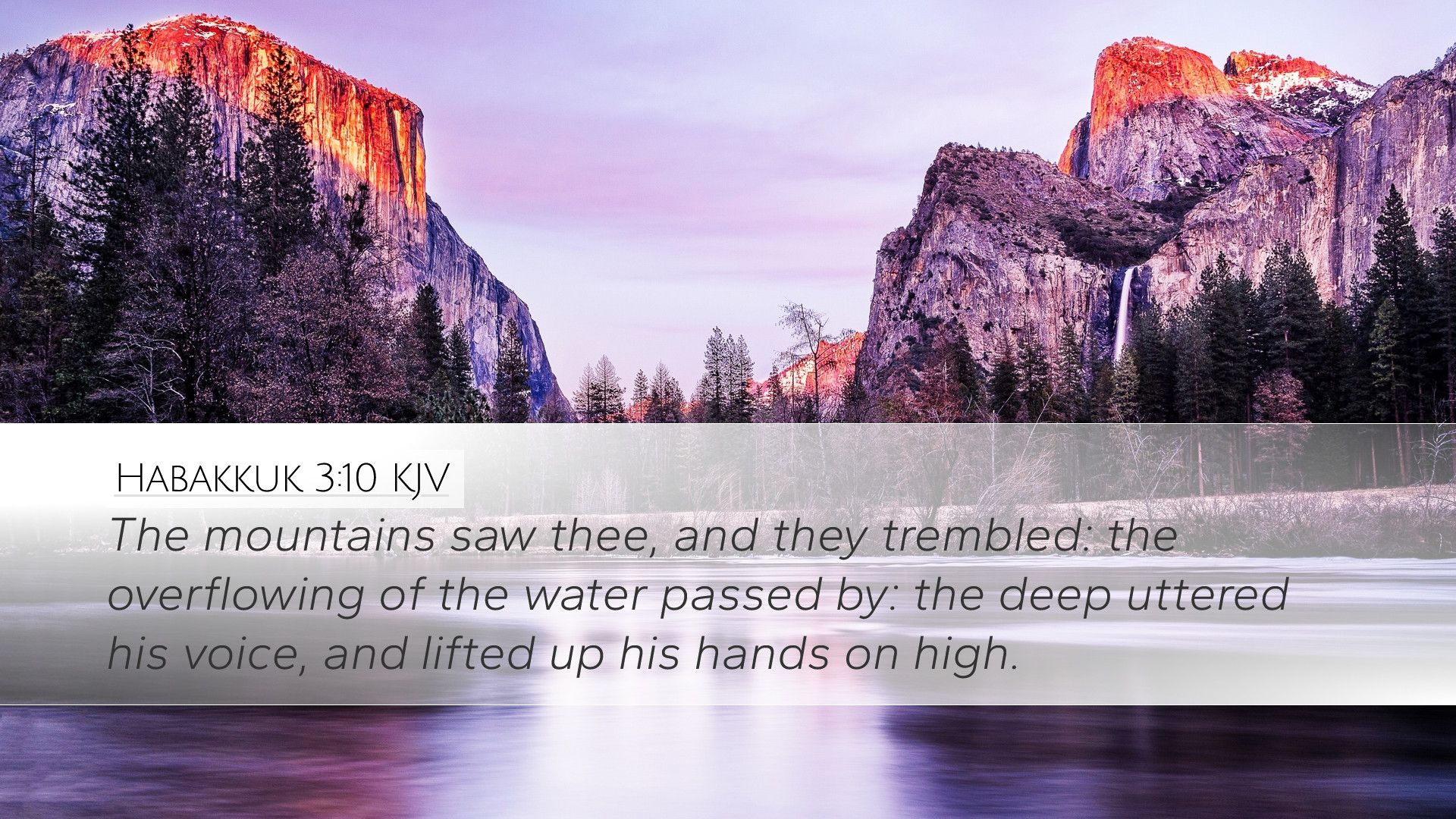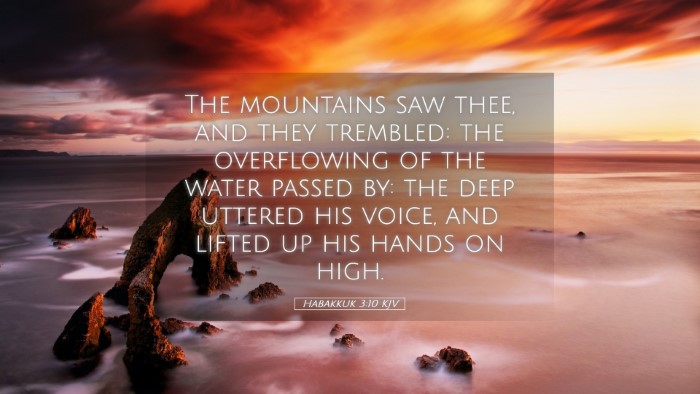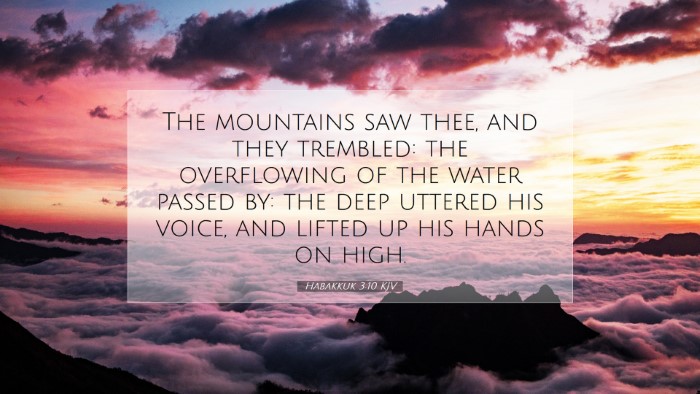Old Testament
Genesis Exodus Leviticus Numbers Deuteronomy Joshua Judges Ruth 1 Samuel 2 Samuel 1 Kings 2 Kings 1 Chronicles 2 Chronicles Ezra Nehemiah Esther Job Psalms Proverbs Ecclesiastes Song of Solomon Isaiah Jeremiah Lamentations Ezekiel Daniel Hosea Joel Amos Obadiah Jonah Micah Nahum Habakkuk Zephaniah Haggai Zechariah MalachiHabakkuk 3:10
Habakkuk 3:10 KJV
The mountains saw thee, and they trembled: the overflowing of the water passed by: the deep uttered his voice, and lifted up his hands on high.
Habakkuk 3:10 Bible Commentary
Commentary on Habakkuk 3:10
Verse Reference: Habakkuk 3:10 - "The mountains saw thee, and they trembled: the overflowing of the water passed by: the deep uttered his voice, and lifted up his hands on high."
Contextual Overview
The book of Habakkuk positions itself in a turbulent time within the history of Judah, where the prophet grapples with questions of divine justice and the nature of God in the face of societal decay. Chapter 3 of Habakkuk is a prayer of the prophet, a beautiful poetic reflection on God’s past deliverance and a hopeful anticipation of His future intervention. This particular verse, Habakkuk 3:10, stands as an integral part of this theophany—wherein God reveals His power and majesty in nature.
Thematic Insights
Analyzing this verse, several themes emerge:
- The Sovereignty of God: The trembling of the mountains signifies God’s ultimate control over nature. Ancient cultures often associated mountains with permanence and strength, yet here, they are seen as trembling before the Creator.
- Creation's Response to God: In the imagery of water overflowing and the deep lifting up its hands, we find a personification of creation responding to the divine presence. This further emphasizes the reverence that all of creation has towards its Maker.
- The Majesty of God: The vivid imagery communicates the awesome power of God. The phrase “the deep uttered his voice” suggests an overwhelming and spectacular display of God's authority, which evokes both fear and awe.
Commentary Insights
Matthew Henry's Commentary
Matthew Henry reflects on the cosmic significance of God's actions as described in Habakkuk 3:10. He emphasizes the revelatory aspects of God’s interactions with creation. According to Henry, the mountains witnessing God’s might serve as a testimony to God’s omnipotent nature; they were "aware" of His greatness. The trembling of mountains symbolizes their recognition of His majesty and the order God brings to the chaos of life.
Albert Barnes' Notes on the Bible
Albert Barnes provides further elaboration by interpreting the circumstances which led to this prophetic utterance. He notes that the 'overflowing water' illustrates God’s power that makes even the most chaotic forces of nature subservient to His will. Barnes surmises that through this imagery, the prophet expresses not just fear but also reverence for God’s ability to control creation in profound ways, which can inspire hope and trust for believers facing adversities.
Adam Clarke's Commentary
Adam Clarke approaches this verse from a linguistic perspective, examining the original Hebrew wording. He stresses the depth of emotion captured in the text. Clarke interprets the "hands lifted high" as a gesture of supplication or worship, a comforting image indicating that the deep is not only terrified but also reaching out to God in recognition of its Creator. This interaction depicts a relational dynamic between God and His creation, illustrating that the awe of God brings creation to a place of humility and acknowledgment.
Theological Reflections
For pastors and theologians, this verse prompts reflections on the nature of worship and reverence in the presence of God. It challenges the modern mindset of autonomy, urging believers to comprehend the reality of God’s sovereignty and the proper response of humility before Him. The passage beckons such questions:
- How do we behold God’s majesty in our contemporary lives?
- What does it mean for us to acknowledge His sovereignty in the face of chaos?
- How can we foster a spirit of worship that mirrors creation's response to God as depicted here?
Practical Application
The implications of Habakkuk 3:10 extend to the lives of believers today. Emphasizing a theological framework that encourages believers to observe God's interventions throughout history and His continued providence reminds us that, in times of uncertainty, we are called to trust in His powerful hand. Moreover, as pastors convey these truths, they should encourage congregants to cultivate a lifestyle of worship that honors the majestic nature of God, recognizing that the response of creation is a model for the attitudes of the heart.
Conclusion
Habakkuk 3:10 offers a profound insight into the nature of God as witnessed through the lens of creation. Understood through the combined wisdom of Matthew Henry, Albert Barnes, and Adam Clarke, this verse reveals the intricacies of divine sovereignty, the reverence of creation, and the intimate relationship believers are invited into. Such reflections provoke a deeper appreciation for God’s majesty, a recognition of our reliance upon Him, and a call to worship that inspires both fear and hope.


